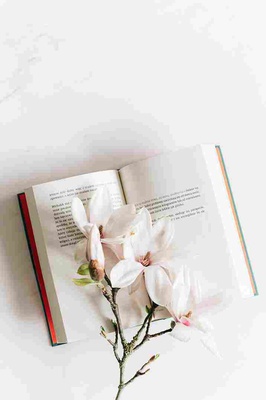Life Lessons From Reading Romance Novels and Benefits of Second Hand Novels to the Environment

Perhaps you've caught a few judgmental looks at your local bookstore's checkout line. And maybe, just maybe, your bestie rolled her eyes when you pulled out your romantic beach read on the sand. People who don't truly understand why many of us are passionate about those gooey, heart-eyed tales of romance can criticize romance novels from cover to content. In fact, there are a few advantages to reading romance novels that you may not have realized.
In the same way that sci-fi piques your interest in time travel and a good mystery awakens your inner detective, romance novels are a celebration of love that inspires readers and teaches them valuable lessons along the way. At their core, romance novels are intended to be an exploration of love that frequently celebrates female power and success. Romance novels may not be for everyone who isn't immediately drawn in by a cover depicting two lovers holding hands or a steamy description of racing heartbeats. But there is a beautiful magic to the way happiness, loyalty, and love are represented in these novels that no other genre does.
To be sure, not all romance novels have these effects, and many of them can be a little too cheesy. Still, you can't judge a genre based on one or even five books. It takes time to find the right book or author for you, but once you do, you'll have an understanding of the genre that will wash over you like the first time you finished your favorite Harry Potter book.
Here are a few advantages to reading a good romance novel.
Reading Romance Novels Can Teach You Life Lessons
For God's sake, speak up!
If romance novels were to mimic real-life relationship conversations, they would (mostly) be boring to read (looking at you, silent-treatment-givers). According to Jayne Ann Krentz, author of Secret Sisters, romance novels teach us that open, honest communication is essential in any good relationship, romantic or otherwise.
Because of Miss Bridgerton author Julia Quinn concurs. "Communication is essential. Honesty and clear communication between the hero and heroine are always the keys to success "she claims.
Jaci Burton, author of Make Me Stay, also includes trust and respect in the mix because, well, duh. "We have the right to demand honesty from the people we care about, to believe we can trust them to mean what they say; and in order to give respect, we must receive it in return," Burton says. "When you feel safe with the person you love, you can give love freely and without reservation." (See also: 8 sex habits of super-happy couples.)
Pay attention to your instincts.
This is a lesson that romance novelist Lenore Edwards refers to as "searching for when your heart calls," and it's one that we should all remember. "Never tell your heart, gut, or instincts to be quiet," Edwards advises. Stop and listen when something tells you that a situation, job, or relationship isn't right—your intuition is almost always correct.
There's nothing wrong with a new beginning.
Restarting can be even more difficult than starting something from scratch. It takes a lot of courage to make changes when you realize something isn't right, but as Eva Coblentz in The Amish Teacher's Dilemma shows, a fresh start can be a positive, life-changing event. A new teaching position and a new potential family is a big adjustment in this new Love Inspired read from Patricia Davids...but one that could change things for the better.
Never, ever give up.
Life is intense and full of obstacles, both in your everyday nonfiction life and in the fictional life of a romance novel heroine. The distinction, of course, is that "romance novels always end on a note of hope," according to Cosby. "You see her digging in, persisting, and moving on" as the heroine faces challenges, even if they are vastly different from your own. Her constant pursuit of a more fulfilled life may inspire you to find new solutions to vexing problems and, ultimately, to take a risk on something new.
Are you looking for "Mr./Ms. Right"? Continue to wait.
It's time to distinguish between romance novels and Disney princess films. In the movies, Prince Charming rides in on his white horse, saves the day, pops the question, and all that nonsense. Is it the former? Maya Rodale, author of Lady Bridget's Diary, disagrees. "In a great romance novel, the 'right' person is one who challenges, tempts, and inspires you to be the fullest and truest version of yourself. True happiness and mutual satisfaction arise when both of you feel loved for who you truly are."
So maybe don't automatically left-swipe on that guy with the dadbod or habit of quoting Will Ferrell movies, because other (read: more important) characteristics like emotionally supporting you and making you happy will outweigh any perceived flaws. (Learn whether a marriage without sex can be healthy.)
You have the ability to reshape your life.
"Stuck" is something romance heroines aren't—at least not for long, and certainly not by the end of the book, according to Cosby. "I can put my characters in situations where they go through things that real people go through, but the difference is that they don't stay in those situations." They may stumble, make mistakes, and encounter roadblocks, but they persevere, changing tactics and redefining goals until they reach their destination. The moral of the story is that you can change your circumstances and get out of a rut, whether it's a toxic friendship or a mundane job.
Take chances.
Darius Taylor-Pratt has serious regrets about how things ended with his ex, but he isn't afraid of rekindling his romance with Audra Covington. Like Darius and Audra, big risks can pay off, and in Reese Ryan's Secret Heir Seduction, that means passionate romance!
Make love to yourself.
According to Edwards, the heroine in the best romance novels is "someone who falls in love with herself" before she falls in love with the guy. "That's when her life starts to get a lot better." The lesson here is that relationships are more satisfying when you begin by falling in love with who you are on your own, rather than who you are as part of a couple.
Love has blinded you? Pass on this one.
Sure, when you're constantly with (and focused on) your significant other, it's easy to lose sight of other relationships. Outside friends and family members, on the other hand, should be treated more as extras than people you call when BAE has plans.
Take a cue from the other relationships in romance novels, says Karen Rose, author of Alone in the Dark. "Other than the hero and heroine, there are other relationships. Readers may learn positive lessons such as how to be a friend or that the family they create can be more fulfilling than the family they were born into "Rose explains. Outside relationships, according to Laura Florand, author of A Wish Upon Jasmine, can only strengthen your romantic one. "For a couple to truly work, you must strike a long-term balance between the demands of being in a couple and maintaining your other relationships," she explains. (Here's how to make ALL of your relationships better.)
Be in control of your sexual needs
Let's not forget that sex is a big part of romance novels! "Much of the courting and sex in romance novels is the woman's ideal," Dr. Holland says, referring to a man who takes his time and is equal parts strong and sensitive. Allow this to motivate you to take control of your own sexual life, ensuring that all of your needs are met in the bedroom. To begin, read aloud a great sex scene from a romance novel to your man to spark some intimacy (and ideas).
Have faith in your objectives.
Going after what you want can take a significant amount of time and energy, which is a valuable resource in today's hectic world. If something is truly important, like Princess Carolina, it is worth pursuing. Of course, you're not looking for a missing daughter like she is in Annie West's Revelations of a Secret Princess, but that doesn't mean you shouldn't be determined to go after it!
Authenticity is important.
As a romance novel progresses, the heroine realizes that the only way she'll get what she wants is to stay true to herself; in fact, her journey of self-discovery is a part of the story's progression. "No one else will believe in her until she believes in herself," says Diana Cosby, author of romantic suspense novels set in medieval Scotland. Consider your own life: if you want to change careers or get a promotion, you're less likely to persuade others to believe in you if you don't first believe in yourself.
Environmental Advantages of Secondhand Novels
With the topic of environmentalism at the forefront of society's mind, many of us are beginning to scrutinize our daily habits more closely. In 2020, society is more aware than it was even ten years ago of how small, simple changes can add up to significant environmental benefits. There are hundreds of ways we can live a more carbon neutral lifestyle, ranging from reducing our use of single-use plastic to cycling instead of driving.
But what does this have to do with books?
The environmental cost of publishing books is enormous. Each year, the newspaper and book publishing industries consume 153 billion gallons of water, with each book consuming two kilowatt hours of fossil fuels and approximately 7.5 kilograms of CO2. Worse, if a book ends up in a landfill, its decomposition produces twice the global warming emissions and toxic impacts on local water systems that it did when it was new.
When this is combined with an estimated 320 million (640,000 tonnes) of waste being sent to landfill each year, a bleak picture of the environmental impact of purchasing new books emerges.
So, as readers, what can we do to assist?
There are numerous options. E-readers have exploded in popularity in recent years, with the production of an e-reader equaling roughly 40-50 new print books. This means that if a reader reads more than this amount, their carbon footprint may be lower if they use an e-reader instead of purchasing new physical copies of the same titles.
But what about the books that are currently in print?
E-readers are bad news for the trillions of books that are currently on the market. If every reader switched to an e-reader, the surplus of supply to demand for physical books would result in massive waste and a huge negative environmental impact. When this is combined with the carbon footprint of producing the e-reader in the first place, it is clear that e-readers are not the most environmentally friendly solution.
Purchasing Used Books
There is, thankfully, a solution: used books.
Choosing used books over new books reduces carbon emissions by less than one-fifth. By purchasing used, you are actively preventing the same books from ending up in a landfill, thereby avoiding the massive environmental impact described above. These books still have great stories to tell, and while we can't undo the emissions from their creation, we can ensure a carbon-neutral future by preventing them from going to waste.
There is also the added benefit of used books being far less expensive than new books. With a new book costing on average £7.48 in the UK, opting for the used equivalent can result in significant savings. So, buying used is not only better for the environment, but it is also better for your wallet!
Overall, purchasing used books is a sustainable mode of consumption. And, while the titles aren't always perfect, there's a certain romanticism in knowing that the book you're holding has been thoroughly enjoyed by those who came before you, and will hopefully be enjoyed by whoever you pass it on to next.



Comments